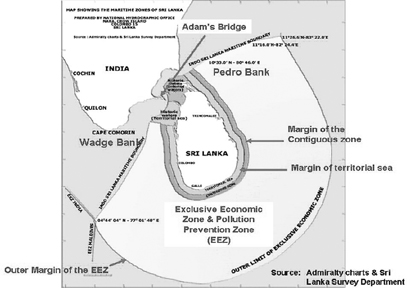Are we using our marine resources in a sustainable manner?
by Mayanthie JAYASINGHE
The Susan George Pulimood Memorial Oration was delivered by Prof
Ruchira Cumaranatunge at the Jeremias Dias Hall of Visakha Vidyalaya on
the 23rd July 2009. The 19th in an unbroken series, the oration was
titled "Are we using our marine resources in a sustainable manner?" It
offered an enlightening glimpse into the largely unwisely exploited,
ocean heritage of the country.
 She spoke about our ocean heritage which stretches for 200 nautical
miles all round Sri Lanka and how it is haphazardly harvested with no
thought of sustainability due to ignorance of proper practices. She spoke about our ocean heritage which stretches for 200 nautical
miles all round Sri Lanka and how it is haphazardly harvested with no
thought of sustainability due to ignorance of proper practices.
Professor Cumaranatunge, speaking on the need for fishing communities
to be educated on methods of value addition as foreign markets for
karawala and "jaadi" were limited as "currently surplus stocks are
turned into dried fish using sunlight to evaporate the moisture or
preserved as "jaadi" by traditional marinating methods after
deterioration of the quality". The low quality of such products is
evident from the strong smell. Smoked fish is a value added product, not
currently produced in Sri Lanka which could reach connoisseur markets.
The fishing community needed to be weaned from unhealthy fishing
practices like using dynamite to catch reef fish, which led to large
numbers of fish and other flora and fauna being destroyed.
The shelf life of fish harvested in this manner is short too. The use
of gill nets with mesh sizes below the size recommended contributed to
unsustainability of the fishery as immature fish get caught from shoals
of migratory fish.
Commercial harvesting of colourful marine ornamental fish,
sea-cucumber ("beche-de-mer"), conch shells ("Chanks"), lobsters etc, is
done "without proper scientific studies done on the sustainability of
such resources" she said.
The non availability of enough deep sea fishing vessels prevent
fishermen making proper use of the fishing grounds further away from the
shore. If deep sea fishing vessels with canning facilities on board or
proper storage facilities are made available Sri Lanka could easily
export surplus stocks harvested in this manner.
The coral reefs found mainly in the South, North-West and the East of
the country are a living heritage built up through eons by the activity
of small animals (Cnidarians) and Zooxanthillae a tiny plant with which
it lives harmoniously. This relationship is very vulnerable to climatic
change and warming oceans as well as to pollutants which cause the
relationship to breakdown and the Zooxanthillae to get ejected from the
coral. This may cause coral bleaching, which in turn contributes to the
destruction of the reef. Such phenomena makes highland vulnerable to
erosion.
Dr. Cumaranatunge explained how a team of local scientists are
growing coral to replace and repair destroyed reefs. She explained how
the original method of growing coral on concrete was not as successful
as the subsequently developed method of growing on iron grids as
vegetations tended to cover the growing tender corals depriving sunlight
reaching the Zooxanthillae.
"Artificial coral reefs can be constructed through transplanting of
corals which could be used for eco-tourism and also help to save the
natural coral reefs for our future generations".
Agar and Carrageenan are currently imported in large quantities for
production of confectionaries, ice-cream, cosmetics, etc. "Farming
marine algae is an underutilized area of commercial importance.
Sea-weeds (sea grasses and algae) and unutilized resources such as
Nudibranchs, sponges, etc., can be of agricultural and medical
importance" says Prof, Cumaranatunge.
Value additions would contribute towards bigger earnings than
exporting minerals in their raw form. e.g. production of Anatase from
Ilmanite, which is currently used to coat surfaces, which needs self
cleaning. Subsequently the country imports products that incorporate
such materials at much higher prices
Finally she touched on the importance of correct awareness through
professional guidance when administrators venture into giant foreign
collaborations example: the Sethu Samudram project, where Sri Lanka
would lose vast tracts of a unique biodiversity but not gain much from
the sacrifice. The delimitation of the outer margin of the Economic
Expansion Zone (EEZ) will give Sri Lanka access to a vast area of the
sea-bed, more than 20 times of its land area. "It is possible that
resources, such as oil, gas and mineral resources exist in the Cauvary
basin and the sea-bed area to be claimed under the expansion of the EEZ"
said Prof. Cumarantunga. She stressed the importance of higher
educational systems being geared to produce researchers and graduates
with knowledge and experience required to reap such resources for future
economic development of the country.
The lecture made one think not only whether we were using our marine
resources but also our qualified professionals' knowledge in a
sustainable manner.
Ruchira Cumaranatunge B.Sc. (2nd Class Hons.) University of Sri
Lanka, Vidyalankara Campus, Ph.D, University of Ashton, Birmingham, UK,
Commonwealth Academic Staff Scholar, University of Ashton, UK, Fulbright
Senior Research Scholar, University of Hawaii, Honolulu, USA, Senior
Professor of Fisheries and Biology, Founder Dean, Faculty of Fisheries
and Marine Sciences and Technology, University of Ruhuna, Matara. She is
currently the Senior Professor of Fisheries Biology at the Faculty of
Fisheries and Marine Sciences and Technology at the University of Ruhuna,
Matara.
|

